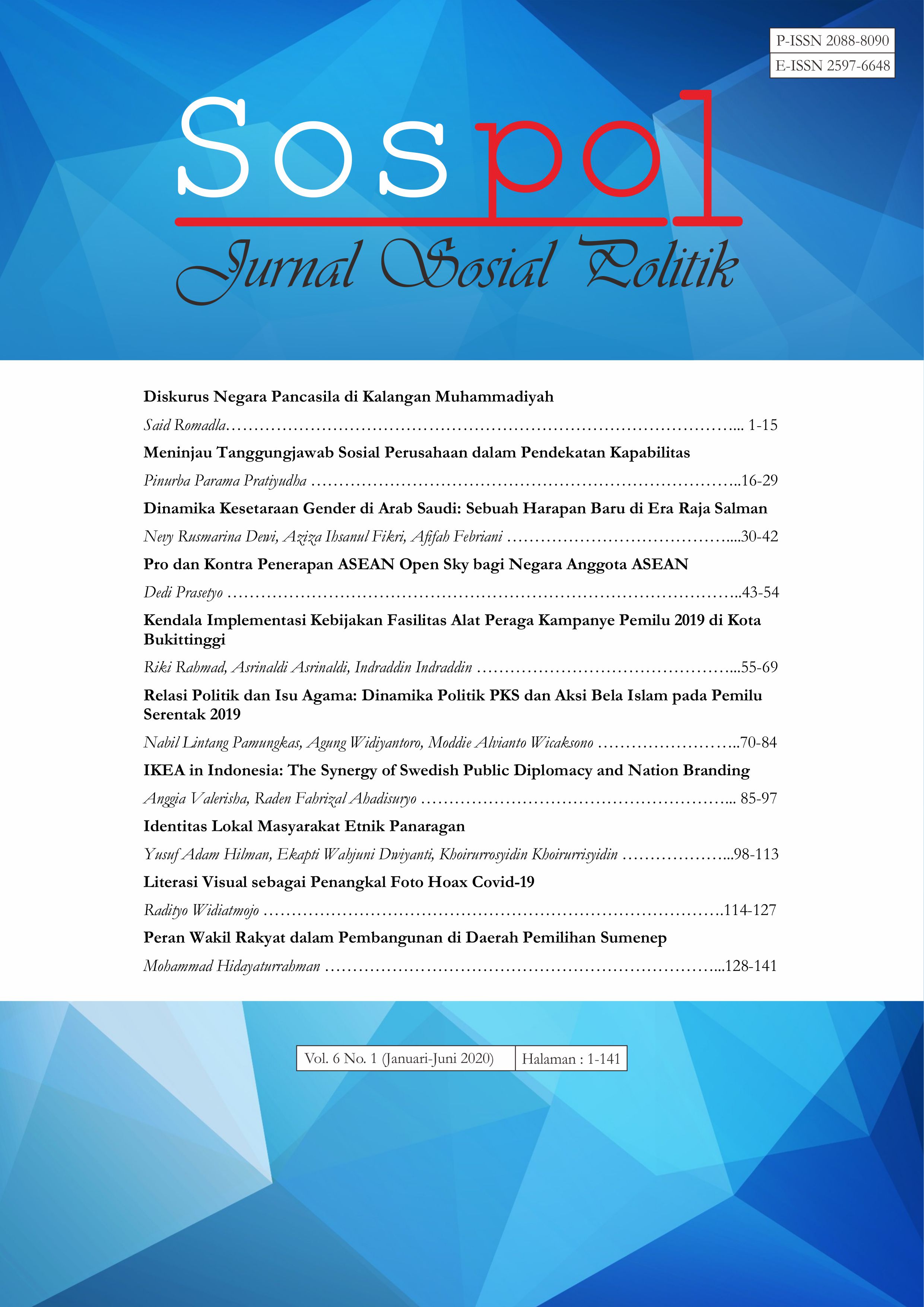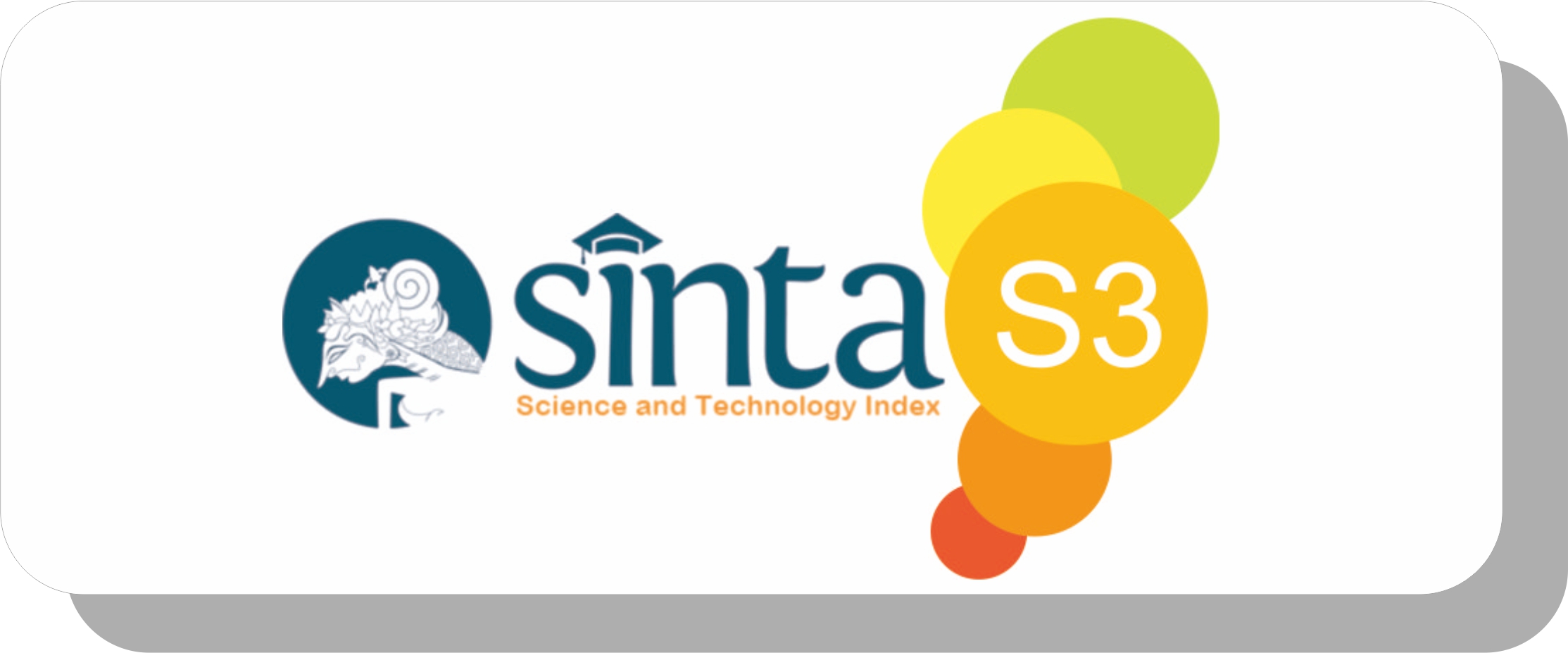Meninjau Tanggungjawab Sosial Perusahaan dalam Pendekatan Kapabilitas
DOI:
https://doi.org/10.22219/sospol.v6i1.11214Keywords:
corporate social responsibility, capability approach, community empowerment.Abstract
This paper departs from the discourse of the paradigm of social development in third world countries. The first discourse reviews the critics of the broad state in social development. It supports the non-state actors to take a part in development through corporate social responsibility (CSR). The second discourse departs from economic development which weakens the capability of the individual in achieving development itself. The concept of the capability approach in human development emerged as a solution to create inclusive welfare. This paper itself raises these two things in one discussion related to the role of CSR in relation to the development of human capabilities. Taking an analysis of the Program Desa Mandiri Energi by PJB UP Paiton, the study examines the role of CSR activities in supporting community capabilities. This paper argues that the existence of CSR provides a strong contribution to strengthening the capabilities of the community that has developed from the past. However, in the subsequent findings, there are several aspects of CSR programs that still several actions to be developed and improved human capabilities.
Downloads
References
Referensi
Bailliard, A. (2014). Justice, Difference, and the Capability to Function. Journal of Occupational Science, 23(1), 1–16.
Bergh, A., & Bjørnskov, C. (2013). Trust, Welfare States and Income Equality: What Causes What? (IFN Working Paper No. 994). Stockholm.
Bjørnskov, C., & Svendsen, G. T. (2012). Does social trust determine the size of the welfare state?Evidence using historical identification. Public Choice, 157(1–2), 269–286.
Braun, V., & Clarke, V. (2014). What can “thematic analysis” offer health and wellbeing researchers? International Journal of Qualitative Studies in Health and Well-being, 9, 26152.
Brinkerhoff, D. W., & Brinkerhoff, J. M. (2011). Public-private partnerships: Perspectives on purposes, publicness, and good governance. Public Administration and Development, 31(1), 2–14.
Chaney, P., & Wincott, D. (2014). Envisioning the Third Sector’s Welfare Role: Critical Discourse Analysis of ‘Post‐Devolution’ Public Policy in the UK 1998–2012. Social Policy and Administration, 48(7), 757–781.
Dean, H. (2015). Social Right and Human Welfare. London & New York: Routledge.
Formosa, P., & Mackenzie, C. (2014). Nussbaum, Kant, and the Capabilities Approach to Dignity. Ethical Theory and Moral Practice, 17, 875–892.
Gluchman, V. (2019). Human Dignity as the Essence of Nussbaum’s Ethics of Human Development. Philosophia, 47, 1127–1140.
Gough, I. (2013). Social policy regimes in the developing world. A Handbook of Comparative Social Policy, 205–224. Diambil dari http://eprints.lse.ac.uk/51023/1/Gough_social_policy_regimes_2013.pdf
Hooghe, M., & Marien, S. (2013). A Comparative Analysis of the Relation Between Political Trust and Forms of Political Participation in Europe. European Societies, 15(1), 131–152.
Iing, M. (2019). Freedom from Development. Law and Development Review, 12(2), 323–349.
Infid. (2010). Program Nasional Pemberdayaan Masyarakat (PNPM) Mandiri: Proyek Buta Tuli Terhadap Aspirasi Masyarakat Desa.
Jacott, L., & Maldonado, A. (2012). Social justice and citizenship education. In P. Cunningham & N. Fretwell (Ed.), Creating Communities: Local, National and Global (hal. 511–517). London: CiCe.
Jones, P. (2017). Formalizing the Informal: Understanding the Position of Informal Settlements and Slums in Sustainable Urbanization Policies and Strategies in Bandung, Indonesia. Sustainability, 9(8), 1–27.
Kajimbwa, M. (2013). New Public Management: A Tribute to Margaret Thatcher. Public Policy and Administration Research, 3(5), 64–69.
Milar, J., & Koning, J. (2018). From Capacity to Capability? Rethinking the PRME agenda for inclusive development in management education. African Journal of Business Ethics, 12(1), 22–37.
Moratis, L. (2016). Consequences of Collaborative Governance in CSR: An Empirical Illustration of Strategic Responses to Institutional Pluralism and Some Theoretical Implications. Business and Society Review, 121(3), 415–446.
Moreno, L. (2010). Welfare mix, CSR and social citizenship. International Journal of Sociology and Social Policy, 30(11/12), 683–696.
Murphy, M. (2014). Self-determination as a Collective Capability: The Case of Indigenous Peoples. Journal of Human Development and Capabilities, 15(4), 320–334.
Ndajiya, A. N. (2017). Corporate social responsibility in multinational oil companies and the impact on sustainable development in the Niger Delta. University of Bradford.
Nussbaum, M. (2004). Beyond the social contract: Capabilities and global justice. Oxford Development Studies, 32(1), 3–18.
Nussbaum, M. (2011a). Capabilities, Entitlements, Rights: Supplementation and Critique. Journal of Human Development and Capabilities, 12(1), 23–37.
Nussbaum, M. (2011b). Creating Capabilites. Cambridge: Harvard University Press.
Pritchett, L., Woolcock, M., & Andrews, M. (2013). Looking Like a State: Techniques of Persistent Failure in State Capability for Implementation. The Journal of Development Studies, 49(1), 1–18.
Quah, J. S. T. (2013). Curbing Corruption in Singapore: The Importance of Political Will, Expertise, Enforcement, and Context. In J. S. T. Quah (Ed.), Different Paths to Curbing Corruption (Research in Public Policy Analysis and Management, Vol. 23) (hal. 137–166). Emerald Group Publishing Limited.
Retamal, T., & Dario, L. (2017). Corporate social responsibility (CSR) and development: the case of gender equality in Latin America. University of Nottingham.
Robeyns, I. (2013). Capability ethic. In H. LaFollette & I. Persso (Ed.), The Blackwell Guide to Ethical Theory (hal. 412–432). Hoboken: Wiley-Blackwell.
Robeyns, I. (2016a). Capabilitarianism. Journal of Human Development and Capabilities, 17(3), 397–414.
Robeyns, I. (2016b). The Capability Approach. In Stanford Encyclopedia of Philosophy. Diambil dari https://plato.stanford.edu/entries/capability-approach/
Robeyns, I. (2017). Wellbeing, Freedom and Social Justice: The Capability Approach Re-Examined. Cambridge: Open Book Publishers.
Rothstein, B. (2011). The Quality of Government: Corruption, Social Trust, and Inequality in International Perspective. Chicago: University of Chicago Press.
Scandelius, C., & Cohen, G. (2016). Achieving collaboration with diverse stakeholders—The role of strategic ambiguity in CSR communication. Journal of Business Research, 69(9), 3487–3499.
Schölmerich, M. J. (2013). On the impact of corporate social responsibility on poverty in Cambodia in the light of Sen’s capability approach. Asian Journal of Business Ethics, 2(1), 1–33.
Sen, A. (1992). Inequality Re-examined. Oxford: Clarendon Press.
Sen, A. (2000). Development as Freedom. New York: Alfred A. Konff.
Sen, A. (2003). Development as Capability Expansion. In S. Fukuda-Parr (Ed.), Reading in Human Development (hal. 41–58). New Delhi & New York: Oxford University Press.
Sen, A. (2009). The Idea of Justice. London: Allen Lane.
Sexsmith, K., & McMichael, P. (2015). Formulating the SDGs: Reproducing or Reimagining State-Centered Development? Globalizations, 12(4), 581–596.
Shivarajan, S., & Srinivasan, A. (2013). The poor as suppliers of intellectual property: A social network approach to sustainable poverty alleviation. Business Ethics Quarterly, 23(3), 381–406.
Soetomo. (2011). Pemberdayaan Masyarakat: Mungkinkah Muncul Antitesisnya? Yogyakarta: Pustaka Pelajar.
Stokke, K. (2017). Politics of Citizenship: Toward an Analysis Framework. In E. Hiariej & K. Stokke (Ed.), Politics of Citizenship in Indonesia (hal. 23–54). Jakarta: Yayasan Pustak Obor Indonesia.
Sukma, R. (2011). Do New Democracies Support Democracy? Indonesia Finds a New Voice. Journal of Democracy, 22(4), 110–123.
Sumarto, M. (2017). Welfare Regime Change in Developing Countries: Evidence from Indonesia. Social Policy & Administration, 51(6), 940–959.
Sutoro, E. (Ed.). (2013). Daerah Inklusif: Pembangunan, Demokrasi Lokal dan Kesejahteraan. Yogyakarta: IRE.
Tiller, E. (2017). Mining and Human Rights. In T. O’Callaghan & G. Graetz (Ed.), Mining in the Asia-Pacific. The Political Economy of the Asia Pacific (hal. 105–119). Cham: Springer.
Vaismoradi, M., Turunen, H., & Bondas, T. (2013). Content analysis and thematic analysis: Implications for conducting a qualitative descriptive study. Nursing & Health Sciences, 15(3), 398–405.
Warburton, E. (2016). Jokowi and the New Developmentalism. Bulletin of Indonesian Economic Studies, 52(3), 297–320.
Westermann-Behaylo, M. K., Van Buren, H. J., & Berman, S. L. (2016). Stakeholder Capability Enhancement as a Path to Promote Human Dignity and Cooperative Advantage. Business Ethics Quarterly, 26(4), 529–555.
Yazan, B. (2015). Three Approaches to Case Study Methods in Education: Yin, Merriam, and Stake. The Qualitative Report, 20(2), 134–152.
Yin, R. K. (2009). Case Study Research: Design and Methods. Los Angels: SAGE Publications Ltd.
Yuda, T. K. (2016). Memaknai ulang corporate social responsibility: Upaya mewujudkan fair responsibility. Jurnal Ilmu Sosial dan Ilmu Politik, 19(3), 200–217.
Wawancara
AM. (2019). Andung Biru, Probolinggo, Agustus 2, 2019.
AR. (2019). Andung Biru, Probolinggo, Agustus 8, 2019.
BT. (2019). Andung Biru, Probolinggo, Agustus 11, 2019.
DA. (2019). Andung Biru, Probolinggo, Agustus 10, 2019.
DI. (2019). Andung Biru, Probolinggo, Agustus 8, 2019.
EG. (2019). Andung Biru, Probolinggo, Agustus 11, 2019.
ES. (2019). Andung Biru, Probolinggo, Agustus 10, 2019.
FU. (2019). Andung Biru, Probolinggo, Agustus 13, 2019.
HE. (2019). Andung Biru, Probolinggo, Agustus 6, 2019.
IM. (2019). Andung Biru, Probolinggo, Agustus 10, 2019.
IR. (2019). Andung Biru, Probolinggo, Agustus 10, 2019.
IW. (2019). Andung Biru, Probolinggo, Agustus 11, 2019.
KI. (2019). Andung Biru, Probolinggo, Agustus 4, 2019.
LF. (2019). Andung Biru, Probolinggo, Agustus 5, 2019.
LN. (2019). Andung Biru, Probolinggo, Agustus 8, 2019.
NY. (2019). Andung Biru, Probolinggo, Agustus 10, 2019.
RA. (2019). Andung Biru, Probolinggo, Agustus 1, 2019.
RI. (2019). Andung Biru, Probolinggo, Agustus 4, 2019.
RS. (2019). Andung Biru, Probolinggo, Agustus 9, 2019.
SN. (2019). Andung Biru, Probolinggo, Agustus 1, 2019.
SU. (2019). Andung Biru, Probolinggo, Agustus 6, 2019.
TO. (2019). Andung Biru, Probolinggo, Agustus 2, 2019.
UL. (2019). Andung Biru, Probolinggo, Agustus 2, 2019.
WJ. (2019). Andung Biru, Probolinggo, Agustus 2, 2019.Downloads
Published
How to Cite
Issue
Section
License
Authors who publish with this journal agree to the following terms:
- Authors retain copyright and grant the journal right of first publication with the work simultaneously licensed under a Creative Commons Attribution-ShareAlike 4.0 International License that allows others to share the work with an acknowledgement of the work's authorship and initial publication in this journal.
- Authors are able to enter into separate, additional contractual arrangements for the non-exclusive distribution of the journal's published version of the work (e.g., post it to an institutional repository or publish it in a book), with an acknowledgement of its initial publication in this journal.
- Authors are permitted and encouraged to post their work online (e.g., in institutional repositories or on their website) prior to and during the submission process, as it can lead to productive exchanges, as well as earlier and greater citation of published work (See The Effect of Open Access).

This work is licensed under a Creative Commons Attribution-ShareAlike 4.0 International License.



















